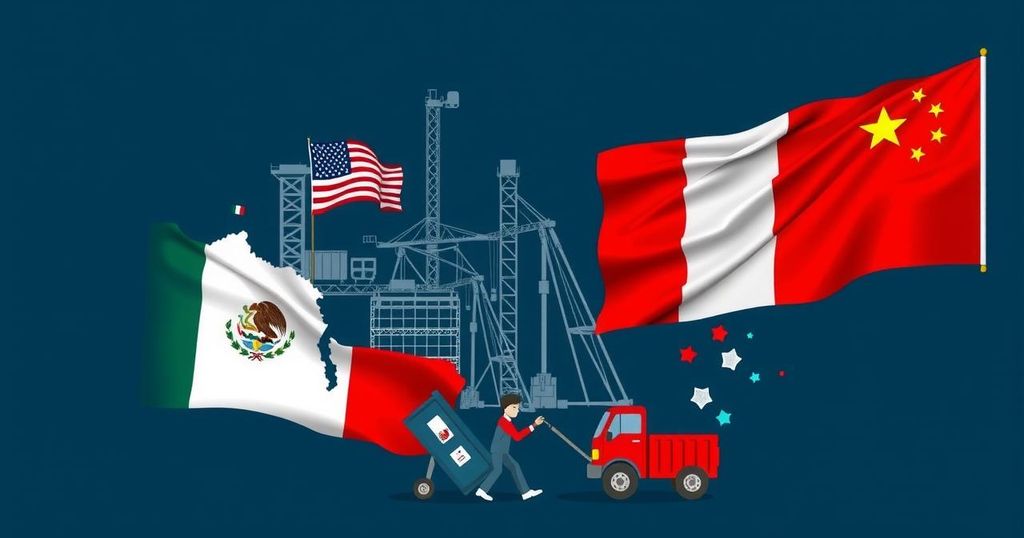Donald Trump plans to impose large tariffs on imports from Mexico, Canada, and China starting the first day of his presidency, citing illegal immigration and drug trafficking as reasons. He proposes a 25% tariff on goods from Mexico and Canada and a 10% increase on Chinese goods, despite potential inflationary effects and historical trade tensions.
President-elect Donald Trump has announced a plan to impose substantial tariffs on goods arriving from Mexico, Canada, and China, effective immediately upon his inauguration. These measures, he claims, will serve as retaliation against illegal immigration and drug trafficking. In his statement on Truth Social, Trump declared that he intends to enforce a 25% tariff on all products from Mexico and Canada and an additional 10% on all Chinese goods to combat the influx of illegal drugs, particularly fentanyl.
Trump emphasized that the tariffs would remain until these neighboring nations address what he describes as an invasion of illegal immigration and drug-related issues. He expressed a belief that Mexico and Canada could easily resolve these concerns, stating, “On January 20th, as one of my many first Executive Orders, I will sign all necessary documents to charge Mexico and Canada a 25% Tariff on ALL products coming into the United States.” He added remarks regarding his frustrations with China over drug shipments and the lack of enforcement against drug traffickers.
The president-elect has a history of advocating for tariffs as a means of bolstering domestic manufacturing while addressing revenue gaps resulting from his proposed tax cuts. Tariffs function as a tax levied on imported goods, and while Trump suggests that foreign nations bear the brunt of these costs, it is typically American consumers who end up paying. Critics, including economists from the Peterson Institute for International Economics, estimate that such tariffs could cost the average U.S. household over $2,600 annually.
Trump’s pick for Treasury secretary, Scott Bessent, believes that the tariffs can be executed without exacerbating inflation, which has garnered favorable responses from Wall Street. However, history suggests that tariffs can lead to retaliatory measures from affected countries, often resulting in trade wars that diminish the intended benefits for American manufacturers.
Trump has indicated that he plans to implement even larger tariffs compared to his previous administration, including proposals of up to 60% on Chinese imports and 10% to 20% on other foreign goods. Such measures could significantly alter the landscape of international trade and domestic economic conditions.
The discussion surrounding tariffs has long been a pivotal aspect of trade policy in the United States, particularly under the Trump administration. Tariffs are intended to protect domestic industries by making imported goods more expensive, thus encouraging consumers to purchase American-made products. However, the implications of tariffs are complex, often leading to increased consumer prices and potential retaliatory tariffs from trading partners. Trump’s previous term saw significant trade tensions, especially with China, where tariffs were imposed in an attempt to rectify trade imbalances and protect American jobs. As he prepares for another term, his renewed focus on aggressive tariff strategies raises questions about economic repercussions both domestically and abroad.
In summary, President-elect Donald Trump’s ambitious tariff proposals aim to address illegal immigration and drug trafficking by significantly increasing import taxes on goods from Mexico, Canada, and China. While the intention is to bolster domestic manufacturing and generate revenue, such measures could impose heavy costs on American consumers and provoke retaliatory trade actions. As Trump seeks to implement these tariffs, the potential economic impact remains a critical area of scrutiny.
Original Source: edition.cnn.com







